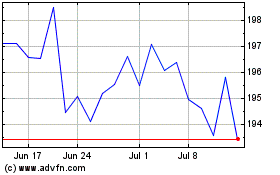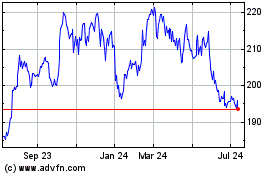UPDATE: ISE To Launch Controversial Options Orders
February 25 2011 - 2:10PM
Dow Jones News
The International Securities Exchange next week will introduce a
long-planned service for trading options contracts that has ignited
controversy among rival options exchanges, and prompted some to
follow suit.
A new type of order will let investors on the ISE's markets
privately carry out large options trades that are linked to a stock
transaction, bypassing potential competition from other
traders.
Regulatory approval for the service marks a key step in the
development of U.S. options trading. At issue is the degree to
which options should resemble the stock market, where one-third of
all trades now take place off the publicly accessible
exchanges.
The ISE's so-called "qualified contingent cross" lets traders
privately arrange packaged transactions incorporating both stocks
and options, and carry out the options piece without other
investors interacting with the order.
The all-electronic exchange, a unit of Frankfurt-based Deutsche
Boerse AG (DB1.XE), sees the function helping it compete against
rivals that operate physical trading floors, where similar
privately negotiated transactions are often carried out between
traders and then submitted to the exchange in open outcry
trading.
"We applaud the SEC in its decision to allow for fair
competition between floor-based and electronic options exchanges
for these large-size contingency trades," said ISE Chief Executive
Gary Katz in a statement Friday.
The ISE aims to introduce the new function on Monday, after the
Securities and Exchange Commission approved it Thursday.
NYSE Euronext, among the exchanges that has objected to the
practice, intends to follow suit, according to a spokesman.
"To ensure a competitive U.S. options marketplace with a
comprehensive choice of services for investors, both NYSE Arca and
NYSE Amex Options anticipate filing similar proposals with the SEC
shortly," he said.
Jeromee Johnson, head of options for BATS Exchange, called the
move positive for large, institutional options investors. BATS may
consider creating a similar function for its market in the future,
he said.
A spokeswoman for CBOE Holdings Inc. (CBOE), the Chicago Board
Options Exchange parent that mounted a vigorous opposition to the
ISE orders after they were first approved by regulators in 2009,
had no immediate comment. Representatives for Nasdaq OMX Group Inc.
(NDAQ), which runs two options markets, did not respond to request
for comment.
Under the ISE's qualified contingent cross orders, the options
portion of the trade must be done at the most competitive price
available nationally and cannot trade ahead of outstanding customer
orders at the same price.
The orders are applicable to all equity options traded on the
ISE, though such transactions must be tied to stock trades and
incorporate at least 1,000 contracts apiece.
-By Jacob Bunge, Dow Jones Newswires; 312-750-4117;
jacob.bunge@dowjones.com
CME (NASDAQ:CME)
Historical Stock Chart
From May 2024 to Jun 2024

CME (NASDAQ:CME)
Historical Stock Chart
From Jun 2023 to Jun 2024
